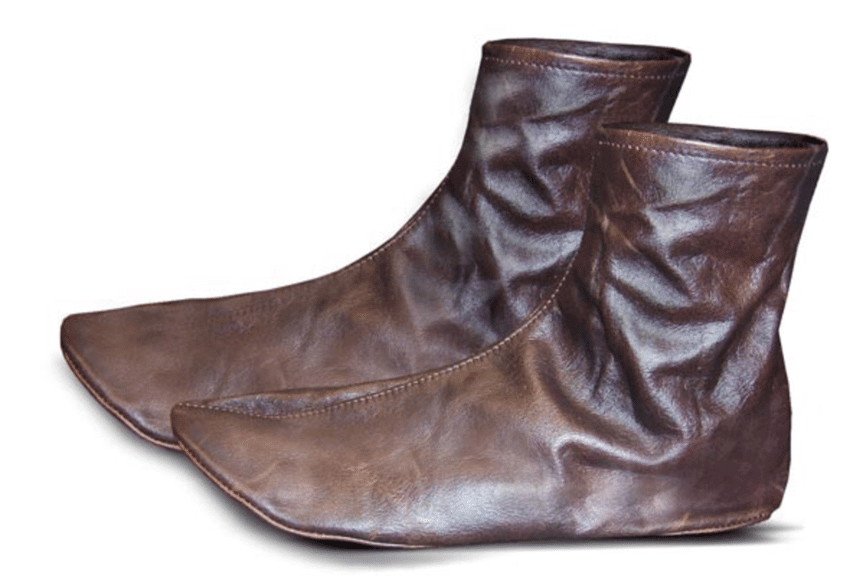
Conditions of wiping over the socks
It is a confirmed Sunnah of the Prophet to wipe over socks in wudu. This makes it easier for the Muslim to perform wudu when he cannot take off his socks.
Wiping over the socks has different conditions. This must be adhered to in order to perform wudu and prayer correctly.
The wudu does not become invalid when having wiped over the socks if there were to be impurity on it. The impurity should just be removed and the wudu is valid.
In this article you read the conditions for wiping over socks made of leather (khoffayn). These also apply to shoes that cover the ankles and socks made of wool, cotton or other fabric.
1. Wipe over the top
To be able to wipe over the socks with validity, it must be done over the top. So you do not wipe at the bottom, soles or at the heels of the sock.
One wipes from the tips of the toes, to the beginning of the shin, without going back.
 'Ali ibn Abu Talib said:
"If the religion were based on opinions, it would be more important to wipe the bottom of the sock rather than the top, but I have seen the Messenger of Allah (ﷺ) wipe the top of his socks."
[Sunan Abi Dawud 162]
'Ali ibn Abu Talib said:
"If the religion were based on opinions, it would be more important to wipe the bottom of the sock rather than the top, but I have seen the Messenger of Allah (ﷺ) wipe the top of his socks."
[Sunan Abi Dawud 162]
2. After having already washed the feet in wudu
The Muslim wears the socks he wants to wipe in a state of purification. He should therefore only wear the socks when he has already performed wudu in full.
After performing wudu, he wears the socks. If his wudoo then becomes invalidated, he wipes over the socks and does not have to wash his feet again.
 Al-Mughirah ibn Shu'bah reported:
I was traveling with the Prophet (ﷺ) and I reached out to take off his leather socks. The Prophet said, "Leave them on, for I have worn them in a state of purity." Then the Prophet wiped over them during wudu.
[Sahih Bukhari 203, Sahih Muslim 274]
Al-Mughirah ibn Shu'bah reported:
I was traveling with the Prophet (ﷺ) and I reached out to take off his leather socks. The Prophet said, "Leave them on, for I have worn them in a state of purity." Then the Prophet wiped over them during wudu.
[Sahih Bukhari 203, Sahih Muslim 274]
3. Not in a state of Janabah
It is not possible to wipe the socks in a state of Janabah (major impurity). That person should then perform the Ghusl (major ablution) and then wear the socks. The next time he has to perform wudu, he wipes his socks if he wishes.
 Safwan bin Assal reported:
While we were traveling, the Messenger of Allah ordered us not to remove our Khuff for three days (72 hours), except in a state of Janabah (major impurity), but not after defecation, urination or sleep (minor impurity).
[Sunan Tirmidhi 96 (Hasan Sahih)]
Safwan bin Assal reported:
While we were traveling, the Messenger of Allah ordered us not to remove our Khuff for three days (72 hours), except in a state of Janabah (major impurity), but not after defecation, urination or sleep (minor impurity).
[Sunan Tirmidhi 96 (Hasan Sahih)]
4. Duration of validity
The period of validity is 24 hours for the non-traveler and 72 hours for the traveler. Time starts when the person wipes their socks for the first time in wudu.
 'Ali ibn Abu Talib reported:
The Prophet (ﷺ) said that the time for wiping the socks is one day (24 hours) for non-travellers and three days (72 hours) for travelers.
[Sahih Muslim 276a]
'Ali ibn Abu Talib reported:
The Prophet (ﷺ) said that the time for wiping the socks is one day (24 hours) for non-travellers and three days (72 hours) for travelers.
[Sahih Muslim 276a]
5. Socks of cotton or any other fabric must be thick
The socks on which it is also valid to wipe over, are thick socks, made of wool or any other fabric. This is because it takes the same ruling as the khuffayn whenever it has the same use and goal.
The goal and use of the khuffayn are to protect the feet from harm when walking outside. These are taken as shoes, not as socks you wear inside your house.
So for that reason, the Fuqaha believed socks must have the same function as the khuffayn, in order for it to take the same ruling. So the socks must be thick, and you should be able to walk in them outside, like you would with shoes.
 Imam Abu Dawud said:
"'Ali bin Abi Taalib, Ibn Mas'oud, al-Bara ibn 'Azib, Anas ibn Malik, Abu Umamah, Sahl ibn Sa'd and 'Amr ibn Huraith wiped their jawrabayn (non-leather socks). The same is also narrated about 'Umar ibn al-Khattab and Ibn 'Abbas."
[Commentary of Sunan Abu Dawud 159]
Imam Abu Dawud said:
"'Ali bin Abi Taalib, Ibn Mas'oud, al-Bara ibn 'Azib, Anas ibn Malik, Abu Umamah, Sahl ibn Sa'd and 'Amr ibn Huraith wiped their jawrabayn (non-leather socks). The same is also narrated about 'Umar ibn al-Khattab and Ibn 'Abbas."
[Commentary of Sunan Abu Dawud 159]
 Imam Tirmidhi said:
"It is the opinion of more than one of the scholars. It was said by Sufyan al-Thawri, Ibn al-Mubarak, Al-Shafi'i and Ahmad. They said that one may wipe over non-leather socks even if these are not worn with sandals, as long as they are thick.”
[Commentary of Sunan al-Tirmidhi 99]
Imam Tirmidhi said:
"It is the opinion of more than one of the scholars. It was said by Sufyan al-Thawri, Ibn al-Mubarak, Al-Shafi'i and Ahmad. They said that one may wipe over non-leather socks even if these are not worn with sandals, as long as they are thick.”
[Commentary of Sunan al-Tirmidhi 99]
6. It should cover the ankle
It is an important condition that the socks cover your ankles. This is a requirement because in wudu one should wash the entire foot, including the ankles.
Wiping over shoes, sandals, leather socks or socks of other fabric is only valid if it covers the entire foot, including the ankles.
The majority of scholars believe that one cannot wipe over the socks if they do not cover the ankles.
 أبو داود: سمعت أحمد سئل على أي خف يمسح الرجل؟
: يواري الموضع الذي يجب عليه الغسل.
"مسائل داود" (57)
Imam Ahmad said:
"It is not allowed to wipe the sock until it covers the parts of the foot being washed in wudu (ankle, heel, sole, etc.)."
[Masail Ahmad 57 bi riwayat Abi Dawud]
أبو داود: سمعت أحمد سئل على أي خف يمسح الرجل؟
: يواري الموضع الذي يجب عليه الغسل.
"مسائل داود" (57)
Imam Ahmad said:
"It is not allowed to wipe the sock until it covers the parts of the foot being washed in wudu (ankle, heel, sole, etc.)."
[Masail Ahmad 57 bi riwayat Abi Dawud]
7. Nothing of the feet should be visible
Some socks have holes through which the skin of the foot is exposed. It is not allowed according to the correct opinion to wipe over such socks.
But it is possible to wipe over the leather socks that have holes in it if one wears thick socks under it, because that would prevent exposing the skin of the foot.
 عبد اللَّه: سألت أبي عن الخف بلا عقب؟
: لا يمسح عليه إذا بدا من رجله شيء، لم يمسح عليه إلا يكون عليه جورب من هذِه التي تلبس بالنعال، وتثبت في الساق.
: كان يسترخي لا يثبت؟
: يمسح حتى مثل الخف.
'Abdullah reported:
I asked my father (Imam Ahmad) about leather socks (khoffayn) with missing heels. He (Imam Ahmad) said: "A person does not wipe it if something appears from his foot. He could only wipe it if he wears a sock under it which is the same thickness of the khoff (leather sock).
[Masail Ahmad 125 bi riwayat 'Abdullah]
عبد اللَّه: سألت أبي عن الخف بلا عقب؟
: لا يمسح عليه إذا بدا من رجله شيء، لم يمسح عليه إلا يكون عليه جورب من هذِه التي تلبس بالنعال، وتثبت في الساق.
: كان يسترخي لا يثبت؟
: يمسح حتى مثل الخف.
'Abdullah reported:
I asked my father (Imam Ahmad) about leather socks (khoffayn) with missing heels. He (Imam Ahmad) said: "A person does not wipe it if something appears from his foot. He could only wipe it if he wears a sock under it which is the same thickness of the khoff (leather sock).
[Masail Ahmad 125 bi riwayat 'Abdullah]


